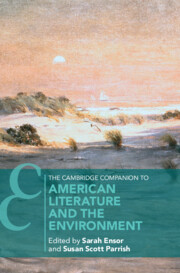Book contents
- The Cambridge Companion to American Literature and the Environment
- The Cambridge Companion to American Literature and the Environment
- Copyright page
- Dedication
- Contents
- Figures
- Contributors
- Acknowledgments
- A Note on the Cover Image
- Introduction
- Part I Environmental Histories
- Chapter 1 Scenes of Human Diminishment in Early American Natural History
- Chapter 2 Slavery and the Anthropocene
- Chapter 3 (In)conceivable Futures: Henry David Thoreau and Reproduction’s Queer Ecology
- Chapter 4 Narrating Animal Extinction from the Pleistocene to the Anthropocene
- Chapter 5 Pastoral Reborn in the Anthropocene: Henry David Thoreau to Kyle Powys Whyte
- Part II Environmental Genres and Media
- Part III Environmental Spaces, Environmental Methods
- Notes
- Index
- Cambridge Companions to …
Chapter 1 - Scenes of Human Diminishment in Early American Natural History
from Part I - Environmental Histories
Published online by Cambridge University Press: 10 March 2022
- The Cambridge Companion to American Literature and the Environment
- The Cambridge Companion to American Literature and the Environment
- Copyright page
- Dedication
- Contents
- Figures
- Contributors
- Acknowledgments
- A Note on the Cover Image
- Introduction
- Part I Environmental Histories
- Chapter 1 Scenes of Human Diminishment in Early American Natural History
- Chapter 2 Slavery and the Anthropocene
- Chapter 3 (In)conceivable Futures: Henry David Thoreau and Reproduction’s Queer Ecology
- Chapter 4 Narrating Animal Extinction from the Pleistocene to the Anthropocene
- Chapter 5 Pastoral Reborn in the Anthropocene: Henry David Thoreau to Kyle Powys Whyte
- Part II Environmental Genres and Media
- Part III Environmental Spaces, Environmental Methods
- Notes
- Index
- Cambridge Companions to …
Summary
From William Bartram to John James Audubon to Susan Fenimore Cooper, early American writers on natural history challenged anthropomorphic thinking and human exceptionalism. Imagining human diminishment amid scenes of natural wonder, they offered a way forward in thinking about “the world we did not make” (William Cronon) that remains largely untraveled today.
Keywords
- Type
- Chapter
- Information
- Publisher: Cambridge University PressPrint publication year: 2022

